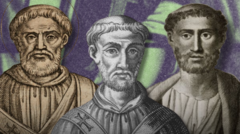This article delves into the pivotal roles of three African popes—Victor I, Miltiades, and Gelasius I—who influenced the Catholic Church's practices, including establishing Easter and St. Valentine’s Day, and examines the hope for a new African pope amidst changing demographics.
The Legacy of African Popes and Their Impact on Christianity

The Legacy of African Popes and Their Impact on Christianity
Exploring how three historical African popes revolutionized Christian tradition and paved the way for modern celebrations.
The heart of North Africa once pulsed with Christian fervor, producing notable popes whose influences resonate in the Church today. As predominantly Muslim regions now encompass this area, many reflect on the historical significance of those early leaders, particularly as discussions arise surrounding the future of the papacy. In this context, a shift is seen with hopes for a new African pope as Catholics await a successor to Pope Francis.
Historian Prof. Christopher Bellitto of Kean University describes North Africa as the ancient "Bible Belt" of Christianity. The legacy of Christianity is tightly woven into the culture and character of the region, historically birthing three papacies that changed Christian liturgy.
Pope Victor I (189-199), reportedly of Berber descent, led during a time of significant persecution. He introduced Latin as the universal language for Catholic Church affairs and resolved the contentious "Easter controversy." Victor I convened the first Roman Synod, advocating for Easter to be universally celebrated on Sunday—an act that compelled Bishops to conform to his decree against the backdrop of a namespace tumultuous Roman Empire.
His successor, Pope Miltiades (AD 311-314), witnessed Christianity's gradual acceptance amid the changing tides of the Roman Empire. He was granted an official residence by Emperor Constantine, marking a pivotal transition where Christianity became the Empire's recognized religion. Miltiades’s legacy includes the construction of the Lateran Basilica, a cornerstone of the Catholic faith.
Gelasius I (AD 492-496), while possibly not born in Africa, was of North African lineage and is notable for being the first pope labeled "Vicar of Christ." He was instrumental in establishing the Doctrine of Two Swords, delineating the powers of Church and state and profoundly shaping the future interplay of religion and governance. Additionally, Gelasius I is credited with instituting St. Valentine’s Day in 496, transforming a pagan celebration into a Christian observance.
Despite the rich contributions of these popes, no papal leader from Africa has emerged since Gelasius I. The decline of the Church in North Africa post-Roman Empire, compounded by the Muslim conquests of the 7th century, adversely impacted the region's Catholic legacy.
While populations of Catholics in Africa have grown—currently constituting 20% of the global Church—electoral processes for popes have remained rooted in Italian predominance. Yet today, with three African contenders—Fridolin Ambongo Besungu, Peter Kodwo Appiah Turkson, and Robert Sarah—the potential for historical change looms on the horizon.
The hope for an African pope suggests a burgeoning recognition of the continent's significant, evolving role within the Catholic Church. With the demographic shift in favor of southern hemisphere Catholics, experts believe a new era might be on the verge of dawn, marked by a papacy that reflects the vibrant and diverse faith communities emerging from Africa.





















